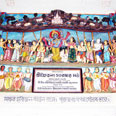Tag: Srila Madhavendra Puri
-
Śrīla Bhakti Sundar Govinda Dev-Goswāmī Mahārāj discusses the proper approach to divinity, and the genuine humility of the true Vaiṣṇavas.
-
Śrīla Bhakti Siddhānta Saraswatī Ṭhākur explains the medicine for the heart first revealed through Śrīla Mādhavendra Purīpād.



